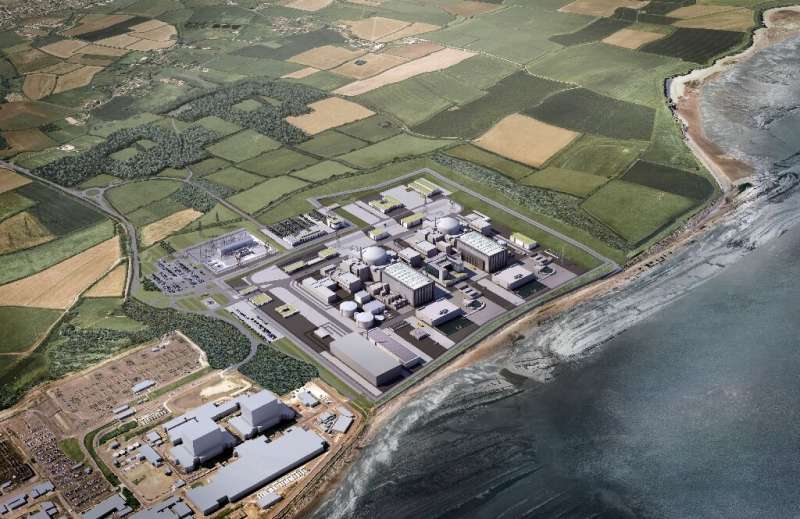A 2016 EDF Energy handout image shows a computer generated image of the Hinkley site—which has been dogged by delays and cost hikes
Britain's controversial Hinkley Point nuclear power plant project faces substantial fresh cost overruns and further delay, France's EDF power giant said Wednesday.
The company, part of a French-Chinese consortium awarded the two-reactor project in 2016 despite criticism from green groups and cost warnings from experts, warned that costs were "now estimated at between 21.5 and 22.5 billion pounds (24.4-25.5 billion euros/$26.8-28.1 billion)."
That equates to a rise of between 1.9 and 2.9 billion pounds over previous estimates.
The project has already been dogged by delay and cost hikes. Following a review, EDF warned two years ago of a £1.5 billion overrun and delays of up to 15 months.
EDF blamed the rising costs largely on difficult ground excavation conditions which required adaptations to ensure the plant meets UK regulations.
But it insisted the new estimation would not impact either consumers or British taxpayers.
A spokesperson for Britain's Department for Business, Energy & Industrial Strategy emphasised that point while adding that "the government negotiated a competitive deal on Hinkley Point C which ensures consumers won't pay a penny until the station generates electricity."
The spokesperson insisted that "lessons learned from Hinkley have the potential to reduce costs for future projects" as Britain looks to transition to a net zero emissions economy by 2050.
The Hinkley Point C project, built in the southwestern English county of Somerset, is supposed to provide seven percent of Britain's total power needs, according to the government.
But critics have focused on the proposed design, which uses a novel European Pressurised Reactor (EPR) system that has been beset by huge cost overruns and delays at sites in France and Finland.
They have also questioned an electricity price guarantee to EDF of £92.5 for every megawatt hour of power produced by Hinkley over the following 35 years, rising with inflation, regardless of falling energy prices.
Britain's National Audit Office (NAO) has also long criticised the scheme, saying the government has "locked consumers into a risky and expensive project with uncertain strategic and economic benefits".
The project, still scheduled to start producing electricity in 2025, has a projected operational lifetime of 60 years.
Heavily-indebted EDF, mainly owned by the French government, is funding around two-thirds of the cost and its Chinese partner the remainder.
Similar problems to those at Hinkley have also hit EDF's reactor project at Flamanville in western France, though the firm has successfully launched two reactors with Chinese partners in the Chinese city of Taishan.
© 2019 AFP























